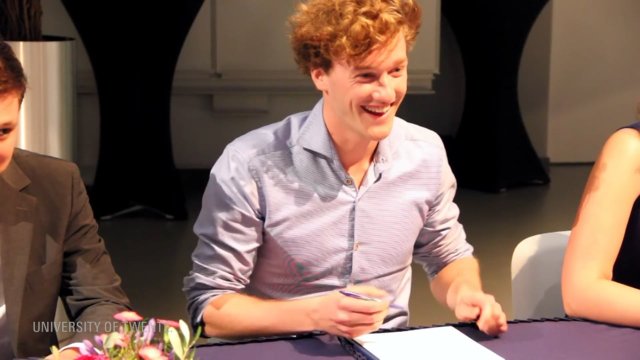The UT vision on education
The University of Twente wants to invest in a sustainable future by educating students who can grow and develop as society changes, who are able to create new knowledge based on their own specialisms in engineering, science or management, and who are aware of the impact this has on society. This foundation will enable Twente graduates to make an impact by designing sustainable solutions and working on ground-breaking research (also see ‘Shaping 2030’).
We teach our students to adopt an entrepreneurial attitude, and to actively search out opportunities and challenges that will take them off the beaten track. In the bachelorprogrammes we do this with our own educational model: the Twente Education Model (TOM).
With TOM we help students to:
... be 'T-shaped'
Our students are strong within their respective discipline, but are also able to utilise their knowledge in a broader context, in partnership with other disciplines and in wider society.
The Twente Educational Model is a response to many of the challenges that higher education faces. Our ever-changing society requires different knowledge and skills than before. Many of the professions that people have today did not even exist twenty years ago. There is also no way of predicting what our students will be doing twenty years from now. We do know that flexibility will be required: our students will probably work in a more complex and rapidly changing environment, and their jobs will be less secure and less permanent than today’s jobs. That is why we want to educate students to become entrepreneurial 'T-shaped professionals'. They know all the ins and outs of their field of study and can contribute to its development. They are also capable of venturing off the beaten path and applying their knowledge in a broader context, in collaboration with other disciplines and society.
... take responsibility
Our students take responsibility for their own development. Our education is designed to actively promote students’ intrinsic motivation.
Student-driven Learning (SDL) means that students take control over their own learning process. To better prepare students for an uncertain future, the aim is to have them at the helm of their education as much as possible. Therefore, our goal is to develop modules in which students can make their own choices, for example in planning and educational activities. This approach to learning should lead to students with a flexible and entrepreneurial attitude. Of course, students' choices are made in close consultation with their teachers: we're strong believers in personal mentoring. Because of this, the role of the teacher changes as well. The teacher provides feedback on the result and the learning process of the student and encourages the student to gain new experiences and explore unknown subjects. Such an entrepreneurial attitude better prepares students for the labour market.
With our student-driven modules and open projects our students have the opportunity to take the reins themselves. Students are therefore expected to take on an active study and work attitude and reflect upon their work themselves. What do they have to pay more attention to? Which activities do they have to complete to attain the learning objectives? Which sources do they need, which role do they take on and in which setting do they perform their project assignment? Making these decisions and therefore being self-directed is something we want our students to learn.
More about Student driven Learning at the University of Twente.
... become skilled as researchers, designers and organisers
Our students grow and develop in three distinct roles: researcher, designer and organiser.
The University of Twente wants to train highly skilled professionals who are able to critically assess, combine and apply scientific knowledge and able to add knowledge. According to the University of Twente’s vision on teaching, students must learn to work in three roles to achieve this: being a researcher, designer and organizer. This is why they start working on projects as soon as possible. Throughout their studies, students can discover which role or roles suite them best. They become adept in a certain field of learning, but will also discover where their true strengths lie, both professionally and personally.

